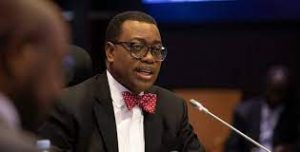By Cynthia Ezekwe
The African Development Bank (AfDB) has projected that the total external debt of Africa will hit $1.13 trillion by 2023, from $1.1 trillion projected in 2022.
Akinwumi Adesina, president, African Development Bank Group, made this known during his keynote speech recently at the Paris Club, where he pointed out some factors responsible for the increase in Africa’s external debt, including the carry-over effects of the Covid-19 pandemic on economies and their fiscal space which led to downgrades of several countries; the rising costs of energy and food prices from the Russian-Ukraine war; and the rising costs of adapting to climate change.
“With the tightening of monetary policies in the US and Europe, interest rates have risen, leading to rising costs of debt servicing. These combined effects have led to 25 countries in Africa being either at the risk of high debt distress or in debt distress. As a result, the external debt service payments due for 16 African countries will rise from $21.2 billion in 2022 to $22.3 billion in 2023,’’ Adesina noted.
According to Adesina, the structure of Africa’s debt has changed dramatically in the past decade or more, accentuating a trend that started in the mid-2000s.
Highlighting the trends that have been the backbone of the external debt increase, AfDB noted that non-Paris Club bilateral creditors and commercial creditors are increasingly becoming major sources of Africa’s sovereign debt.
“While bilateral debt represented 52 per cent in 2000, this declined to 25 per cent by 2021; commercial debt’s share of total debt increased from 17 per cent in 2000 to 43 per cent in 2021. Yearly bond issuances in Africa increased from an average of $10 billion annually in the early 2000s, to about $80 billion annually by 2016–2020. This trend was spurred by the very low global interest rates, with investors looking for yields in emerging markets,’’Adesina added.
He also pointed out that there has been a very rapid growth in debt owed to China, stating that the share of China’s debt rose from just 1 per cent of total debt in the mid-2000s to 14 per cent of total external debt by 2021, which accounts for infrastructure.
“Average interest rates on debt have diverged significantly over time, with multilateral debt at 1 per cent; bilateral debt at 1.2 per cent; China debt at 3.2 per cent; and private debt at greater than 6.2 per cent. The tenure on debt has also widened between creditors; while the maturity of official debt was 30 years (for 62 per cent of the debt), the tenor for bonds averaged 10 years. Thus, we now have a shorter-term debt with higher interest rates,’’ Adesina highlighted.
The AfDB chief further pointed out that an increasing percentage of debt is now in the form of resource-backed loans, stating that between 2004 and 2018, 30 natural resource-backed loans worth $66 billion were signed by African countries.
According to him, most of the loans were backed by oil, minerals, and commodities, and the commodity price crash of 2014 threw 10 out of the 14 countries that used natural resource backed loans into serious debt problems.
Speaking on measures that can be taken to tackle Africa’s debt, he said, given the diverse nature of creditors, most now outside of the Paris-Club, it has become more complex to address debt treatment, debt restructuring and debt resolution. The process has become more complicated, as interests of creditors diverge.
Adesina emphasised on the need to expand the Paris Club to include the commercial and other-non-Paris club creditors, adding that there is need for greater debt transparency across all creditors.
“We need to make the G20 Common Framework work and speedily concluded for Zambia, Chad, Ethiopia, and Ghana, to build momentum for debt treatment for all creditors,’’ he said.
He pointed out that natural resource backed loans should no longer be used, given their non-transparent nature, asymmetry of power in negotiations and compromises of countries.
“We must expand market-derived concessional financing to support countries. This will reduce the level of dependency on expensive short-term debt by countries. The ADF market-option of the African Development Bank Group can help mobilise $27 billion for the low-income countries,’’ the AfDB chief added.
He also noted that greater use of partial credit guarantees at scale can help countries to access capital markets and issue bonds at lower coupon rates and longer maturities, citing the example of AfDB using partial credit guarantees of $375 million to support the issuance of $500 million Panda bond by Egypt, and the use of a partial credit guarantee of EUR 195 million to de-risk a EUR 350 million sustainable development loan from Deutsche Bank to Benin.
“SDR re-channeling to the African Development Bank can be leveraged by the Bank by three to four times to deliver greater financing for African countries. The financial model for SDR re-channeling, with a liquidity support agreement, developed by the Bank and the Inter-American Development Bank has now met the reserve asset status of the IMF,’’ Adesina stated
“What is needed is for 5 countries to provide SDRs to the Bank. A $5 billion allocation will be turned into $20 billion of financing for Africa. A $50 billion allocation to multilateral development banks will deliver $200 billion of new lending to countries,’’ he added.
He further emphasised the need to tackle systemic risks in Africa, stating that Africa is the only region without liquidity buffers to protect it against shocks.
“To change this, the African Development Bank and the African Union are working together to establish an African Financial Stability Mechanism. Such a homegrown mechanism will mutualize our funds and ensure that we avoid spillover effects that come from global shocks,” AfDB president added.











